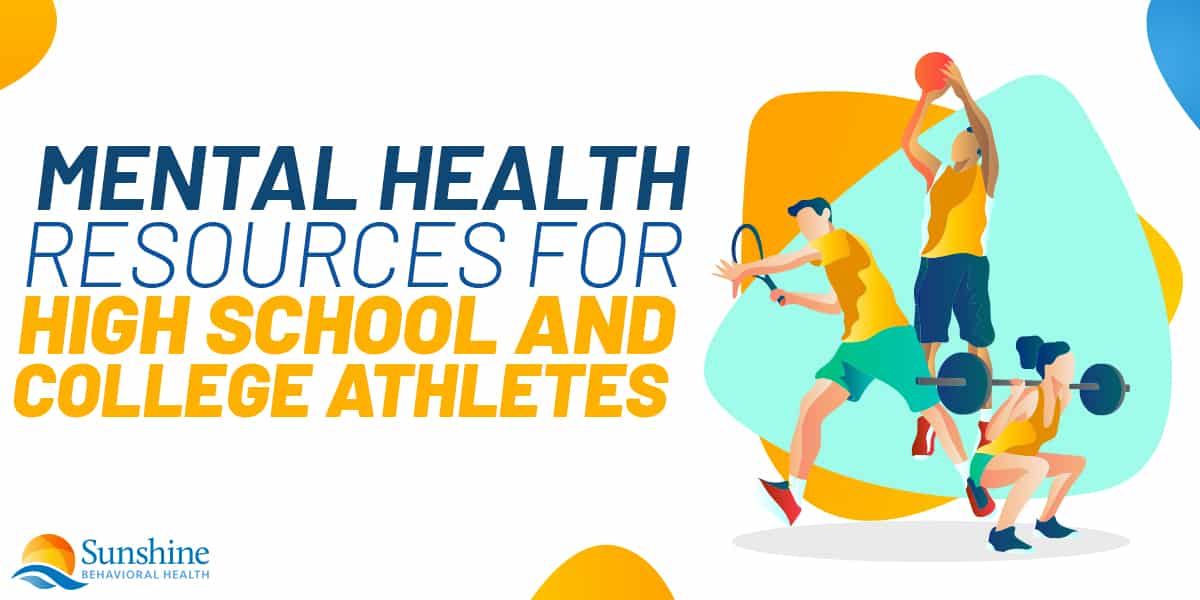- Statistics: Mental Health Issues Among Athletes
- Why Do High School and College Athletes Develop Mental Health Issues?
- What Kinds of Mental Health Issues Can Athletes Develop?
- Addressing Mental Health Issues Among High School and College Athletes
- Helpful Links
Table of Contents
Living with mental health issues can be lonely. For an athlete, these feelings can be magnified.
Athletes feel they always have to be strong because their teammates depend on them. If they don’t do their part, they might feel weak or like a failure. When they have physical injuries, they’re supposed to play through the pain. If they have broken bones and need a crutch to get around, at least it’s obvious why they can’t.
On the other hand, mental health issues are not so obvious. There’s no plaster cast or sling. Without such physical evidence, some people don’t believe that mental health disorders—such as depression, anxiety, or substance use disorders—are real. After all, it’s not like your arm has been wrapped up in some sort of cast or sling.
Even when they are believed, there remains a stigma against mental illness because people don’t understand it. If left untreated, a relatively minor mental illness can become worse, even life-threatening.
Although athletes sometimes are all alone when playing—on the pitcher’s mound, in the starting blocks, or at the free-throw line—they needn’t deal with their mental health issues alone. No matter what level of sport, amateur or professional, there are resources available to help.
Statistics: Mental Health Issues Among Athletes
Growing up, many athletes are taught that they simply have to tough it out. After all, what kind of athlete doesn’t play hurt from time to time? At the end of a long season, nobody is 100% fit.
Unfortunately, mental health issues are common among athletes:
- More than 51.5 million adults in the United States live with mental health issues.
- Close to one in five adults experience a mental health issue at some point in their lives.
- Approximately one-half of all college-aged individuals experienced significant symptoms of depression, anxiety, or other mental health issues at some point during the past 12 months.
- Only 15% of college students with mental health issues seek help.
- Approximately one-third of professional athletes have a mental health condition.
- Close to one in five athletes struggle with alcohol abuse.
When athletes understand what resources are available to them and ask for help, they can manage their conditions and continue to compete to the best of their abilities.
Why Do High School and College Athletes Develop Mental Health Issues?
From a young age, athletes are taught to be tough, play through injuries, and keep competing even when sore or tired. This same attitude can contribute to mental health issues.
Here are some risk factors for mental health problems:
- Time demands. It is not unusual for high school and college student athletes to spend more than 30 hours per week on their sport. This can cause them to neglect other obligations, develop stress, and lead to serious mental illness.
- Sleep concerns. Early morning practices (5 a.m.), travel time to games or matches, and the need to study and complete homework can leave student athletes feeling sleep-deprived. A lack of sleep can increase the chances of developing a mental health disorder.
- Pressure. There is a saying that pressure is a privilege. Some coaches motivate their student athletes with pressure. Many athletes put this pressure on themselves because they want to compete to the best of their abilities. Whether it comes from coaches, teammates, parents, or themselves, such pressure can lead to mental health issues such as stress, anxiety, and substance use disorder.
- Scholarship policies. If student athletes pay for their education with a scholarship tied to athletic performance, that adds another level of stress and anxiety that can contribute to the development of mental health problems.
- Harassment and discrimination. Hazing is common when one joins a team, especially for players from minority backgrounds. Such hazing can lead to the development of mental health issues.
- A culture of toughness. Athletes must learn to stand strong in the face of adversity, but if they won’t admit they need help, mental health issues can fester unchecked.
What Kinds of Mental Health Issues Can Athletes Develop?
There are several common mental health issues that high school and college athletes may develop.
Anxiety Disorders
Anxiety disorders are some of the most common mental health issues that may develop among athletes. Many athletes at times face performance anxiety that impairs their ability to compete.
Self-diagnosis is difficult because the physical symptoms of anxiety—rapid heart rate, sweating, shortness of breath, and trembling—can resemble other psychological or physical problems. In addition, the psychological symptoms of anxiety—feeling stressed or overwhelmed—can be mistaken for obsessive worrying.
Sometimes anxiety is tied to a medical issue or substance use disorder.
Athletes who experience severe anxiety need to reach out to mental health professionals for help. Therapy and sometimes medications can reduce or relieve the symptoms of anxiety.
Mood Disorders
Mood disorders affect the way people feel, their moods. The conditions afflict adults and children, including athletes. Mood disorders are becoming more common among athletes.
There are two main types of mood disorders:
- Major depressive disorder. Depression, also called clinical depression, is characterized by feelings of sadness and a lack of interest in most things that can persist for years.
- Bipolar disorder. Formerly called manic depression, bipolar disorder is characterized by periods of high energy (irritability as well as happiness) and low energy.
Common symptoms of mood disorders include:
- Sadness
- Difficulty falling or staying asleep
- Lack of energy and motivation
- Inability to concentrate or focus
- Loss of interest
- Weight changes
- Appetite changes
Some problems specific to athletes include:
- Poor performance during practices and games
- Trouble tolerating teammates or coaches
Mood disorders also can be side effects of medical problems, such as thyroid disorders. The sooner these issues can be addressed, the better the prognosis might be.
Personality Disorders
Another common type of mental health issue among athletes is a personality disorder: when a personality trait is taken to an extreme in an unhealthy and inflexible way.
For example, many athletes in high school and college have personality traits such as perfectionism, extraversion, and narcissism. Such traits can become disorders when they lead to impulse control problems or interpersonal difficulties.
Athletes with personality disorders may end up misconstruing comments or situations. They end up making it difficult for athletes to relate to their coaches and teammates. This can contribute to team instability and mental health issues in other team members.
Individuals with personality disorders also have a hard time coping with difficult situations. If they reach out to mental health professionals for help, they may be able to manage their personality disorders.
Body Dysmorphic Disorder
Body dysmorphic disorder is a preoccupation with an imagined defect in physical appearance. The extreme distress it causes can lead to extreme weight loss, anorexia or bulimia, and a preoccupation with cosmetic surgery.
Body dysmorphic disorder is more common among athletes in sports that require participants to be scantily clothed. Common examples include swimming, gymnastics, ice skating, and cheerleading.
Athletes with body dysmorphic disorder can develop anxiety, depression, and guilt. Body dysmorphic disorder is more common if teammates are criticized or made fun of for their physical appearances.
Substance Use Disorders
Substance use disorder, which could lead to a substance use disorder, is also common among high school and college athletes.
Among the reasons are:
- To gain a competitive edge. Some substances (stimulants, steroids) are performance enhancers.
- To control pain. Some injuries don’t stop hurting when they seem healed. Opioids can prevent lingering distress from hurting athletic performance.
- To unwind. Tobacco, alcohol, marijuana, and opioids can help athletes de-stress after a difficult practice or game.
Many student athletes only use these substances during the off-season because they worry that they could impair performance during the season. Besides, if detected by a blood test, they could result in suspension, expulsion, or disqualification.
There could be many other consequences related to illicit substance use, including:
- Academic problems
- Physical injuries
- Driving under the influence
- Trouble sleeping
- Sexual abuse
Furthermore, long-term substance use disorder can change the neural pathways of the brain, causing substance use disorders such as addiction that rewire the reward system. In time, the student athlete won’t care about athletic performance or anything besides getting high.
Addressing Mental Health Issues Among High School and College Athletes
Mental health issues are common even among high school and college athletes. That doesn’t mean they can be safely ignored. Poor mental health impairs the ability to function on the field, in school, and life. Accidental death and suicide are possible risks.
Mental health disorders also often co-occur with substance use disorders, which increases the risk of suicide and accidental death.
Athletes should turn to their coaches and teammates if they feel like they are experiencing mental health issues. If they are open and honest about what they are feeling, their teammates and coaches may be able to help them.
Coaches and teammates should be aware of and watchful for the signs of mental health disorders too.
If athletes feel they can’t reach out to their coaches and teammates, they can reach out to their family members, friends, and primary care physicians.
Other resources that could be helpful for high school and college athletes struggling with mental health issues include:
- National Collegiate Athletic Association (NCAA). The NCAA Sport Science Institute offers Mental Health Educational Resources—fact sheets, videos, and campus resources—for improving college athletes’ mental health.
- Athletes for Hope. An organization founded by professional athletes offers a self-care plan worksheet and national resources on its page Mental Health and Athletes.
- National Alliance on Mental Illness (NAMI). NAMI’s HelpLine Resource Directory includes support organizations, treatment locators, financial assistance, advocacy and legal information, community support services, and research and statistics.
- National Institute on Mental Health. NIMH’s Help for Mental Illnesses page includes helplines and treatment locators, as well as information on emerging research.
No athlete should ever feel like they have to face these issues alone. There are always professionals who are willing to lend a helping hand to those in need, including high school and college athletes.
Helpful Links
Other resources that athletes may find helpful include:
- Junior Volleyball Association – Mental Health Guidance and Resources for Coaches, Athletes, and Parents
- Athletes Connected. Created with a grant from the NCAA, this University of Michigan program increases awareness of mental health issues and encourages student athletes to seek help by reducing stigmas about seeking assistance, promoting positive coping skills, and providing related articles and research.
Sources
Medical disclaimer:
Sunshine Behavioral Health strives to help people who are facing substance abuse, addiction, mental health disorders, or a combination of these conditions. It does this by providing compassionate care and evidence-based content that addresses health, treatment, and recovery.
Licensed medical professionals review material we publish on our site. The material is not a substitute for qualified medical diagnoses, treatment, or advice. It should not be used to replace the suggestions of your personal physician or other health care professionals.







